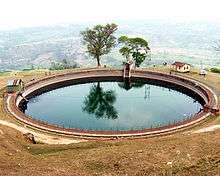Pharping Hydropower Station
| Pharping Hydro Power Project | |
|---|---|
 | |
 Location in Nepal | |
| Country | Nepal |
| Location | Pharping, Bagmati District |
| Coordinates | 27°36′0″N 85°16′0″E / 27.60000°N 85.26667°ECoordinates: 27°36′0″N 85°16′0″E / 27.60000°N 85.26667°E |
| Purpose | Power |
| Status | Operational |
| Construction began | 1907 |
| Opening date | 1911 |
| Construction cost | ₨713,273.82 |
| Owner(s) | Nepal Electricity Authority , Government of Nepal |
| Dam and spillways | |
| Type of dam | Run-of-the-river hydroelectricity |
| Reservoir | |
| Creates | Chandrajyoti Hydro-electric power station |
| Catchment area | 528733 cu. ft |
| Maximum water depth | 18 feet |
| Power Station | |
| Commission date | 1911 |
| Type | Pumped-storage hydroelectricity |
| Hydraulic head | 288 lbs/sq Inch |
| Turbines | 2 × 250 KW |
| Installed capacity | 500 KW |
Pharping Hydro Power Project is the first hydro-power project of Nepal and second of Asia. This is situated in Kathmandu district.[1] In 2010 it was declared a Living Museum by government of Nepal and was open for public.
History
Pharping Hydro Power was established in 1911 as Chandrajyoti Hydro-electric power station by Prime Minister Chandra Shamsher Jang Bahadur Rana.Plant was Inaugurated by King Prithvi Bir Bikram Shah Dev on Monday, 22 May, 1911at around 6: 30 Pm by turning the lights on during a program in Tudhikhel, Kathmandu.
Reservoir
Currently water from the reservoir lake is used for drinking water supply for Lalitpur District.
Nepal Electricity Authority
Nepal Electricity Authority took over Chandrajyoti Hydro-electric Power Station and renamed it Pharping Hydro Power Station and had since been smoothly running the power station till the late 1990s when it was considered that the aging power station needed to be converted into a heritage site.In 2010 it was declared a Living Museum by government of Nepal and was open for public.
See also
References
- ↑ "Students observe Pharping Hydropower Project as part of Water Week". Gorkhapatra Online (The Rising Nepal). Retrieved 25 July 2014.